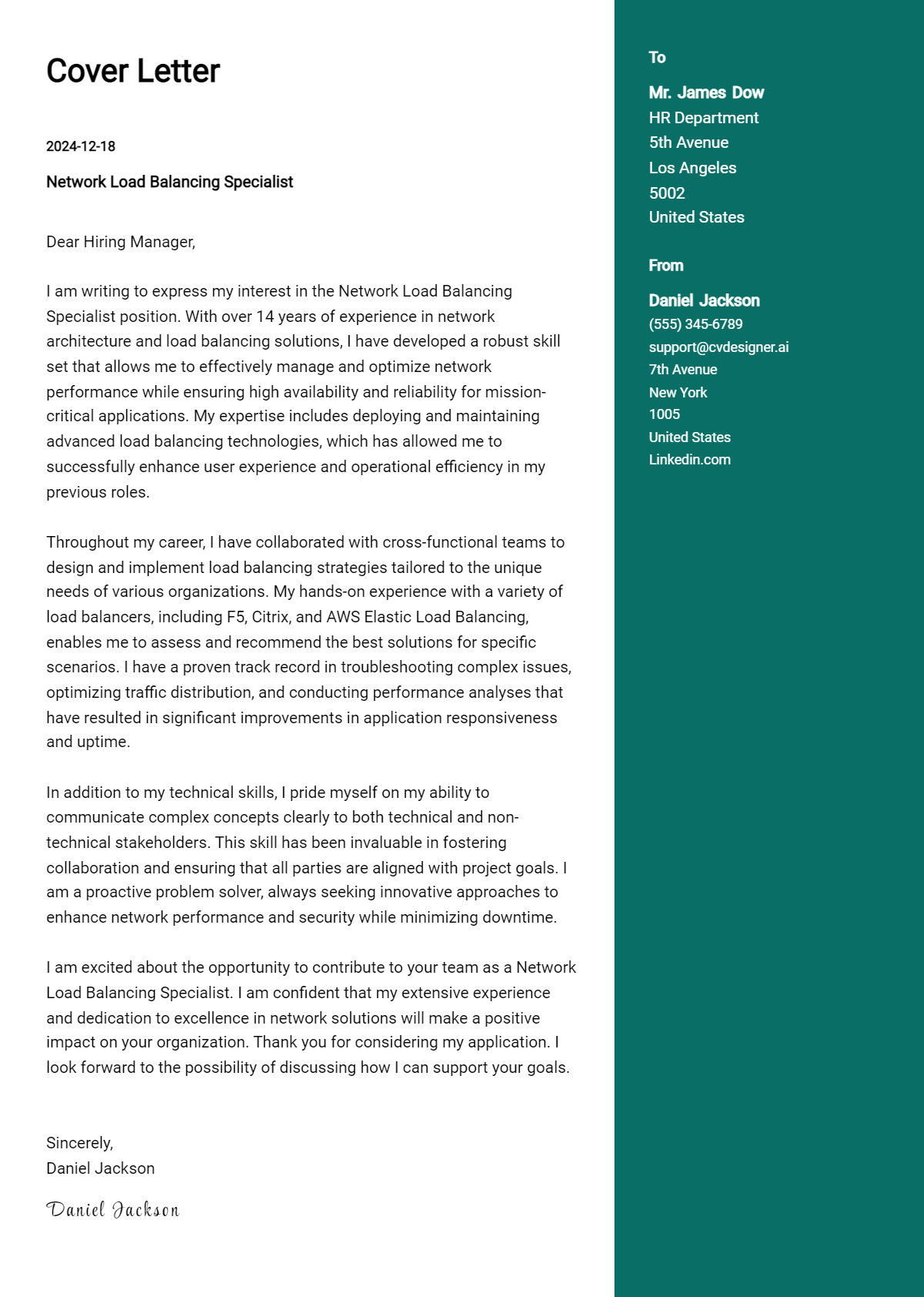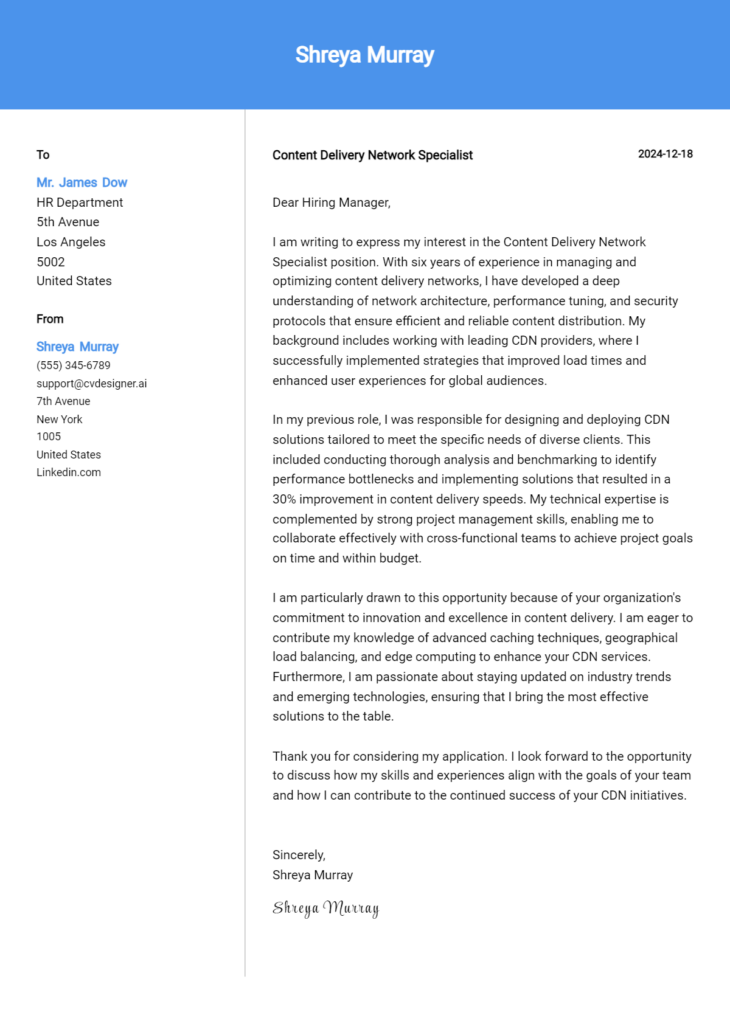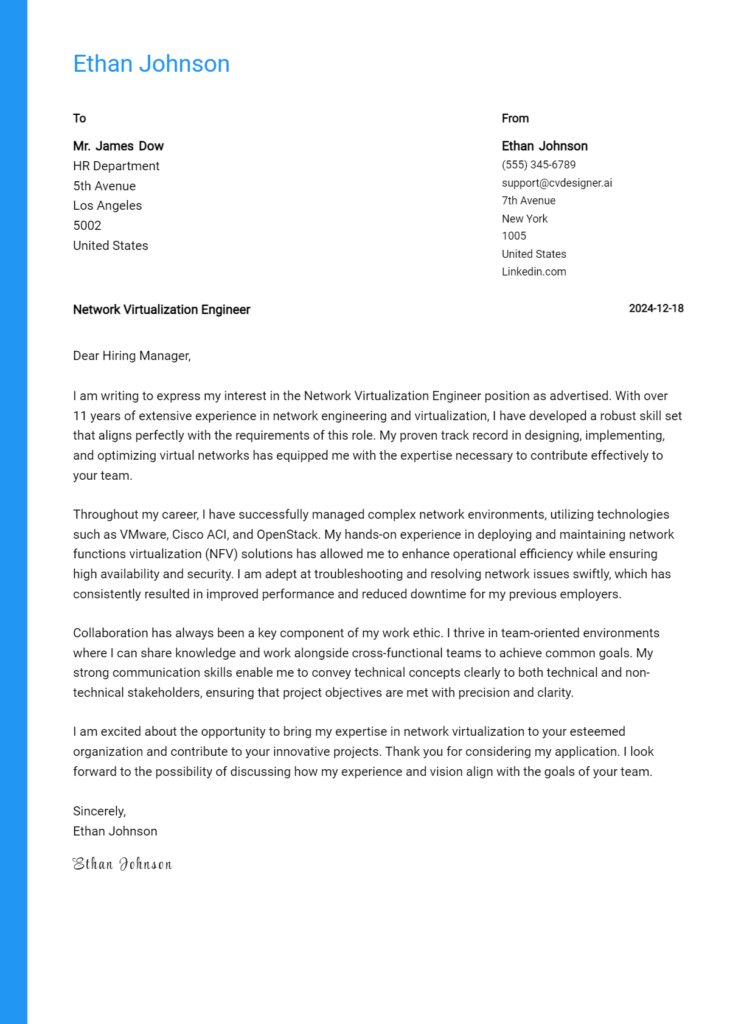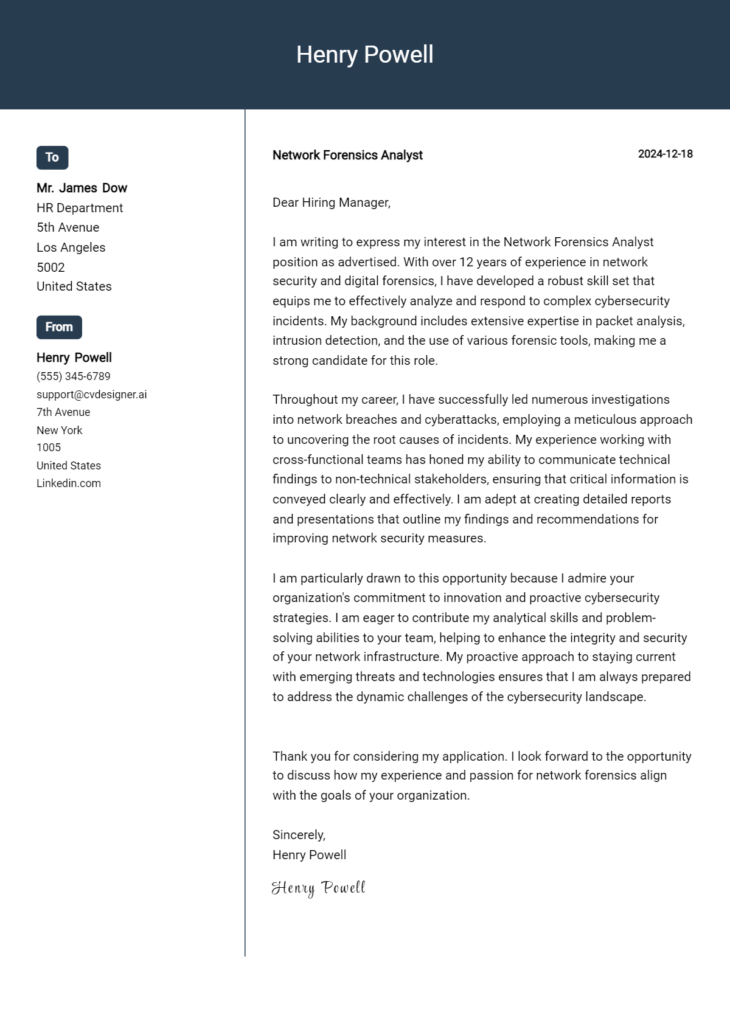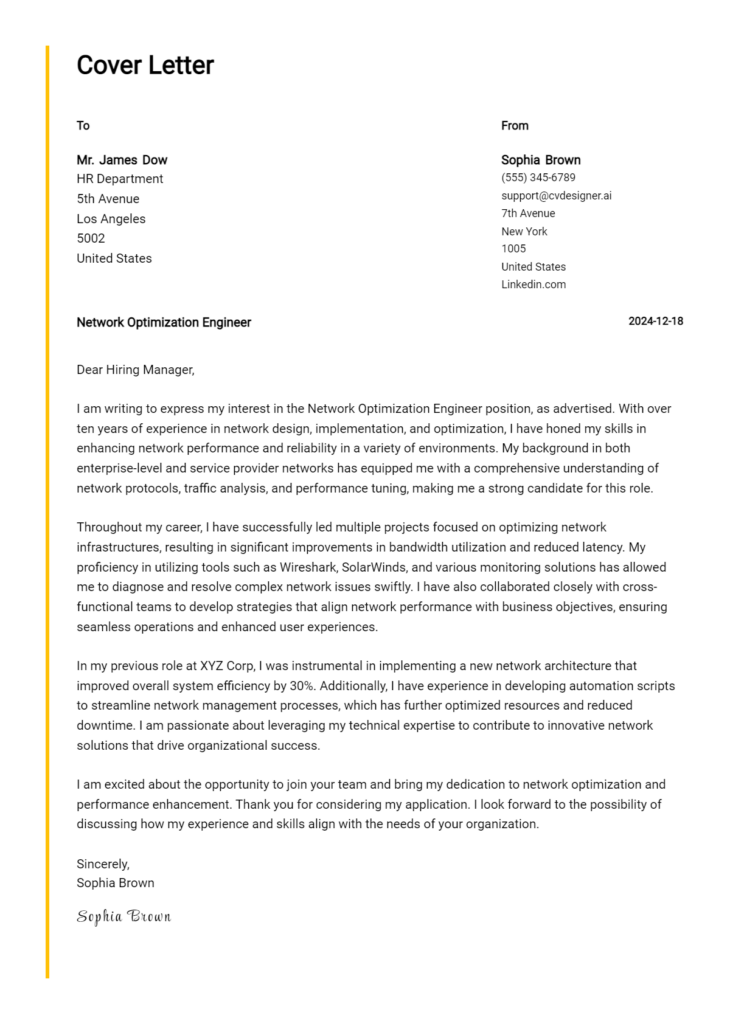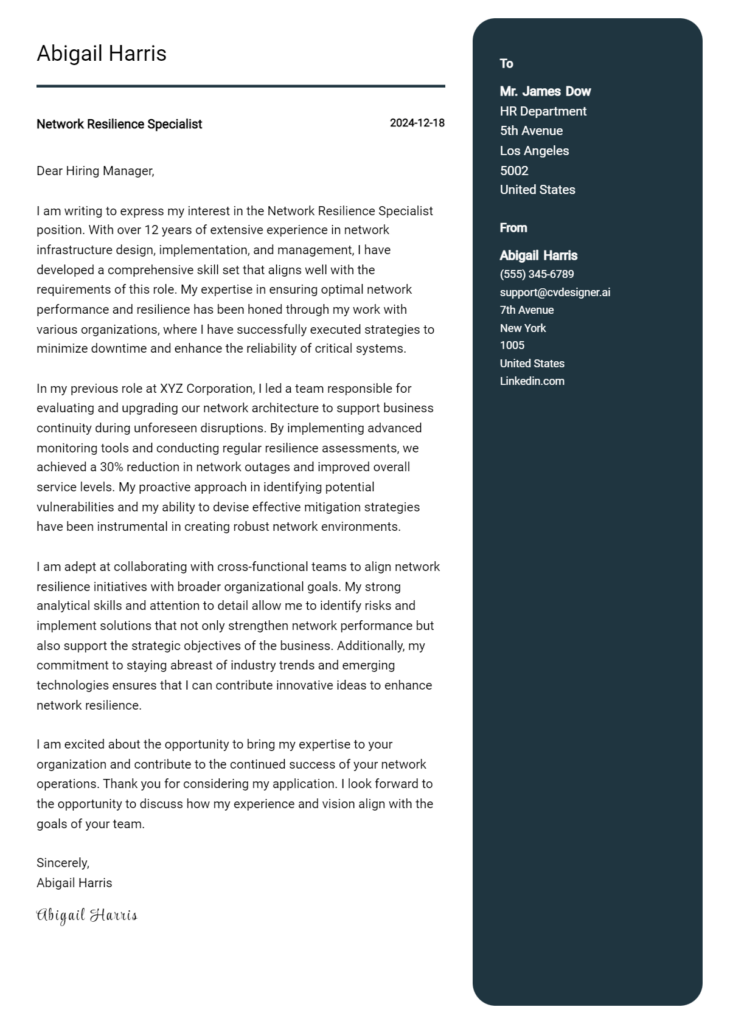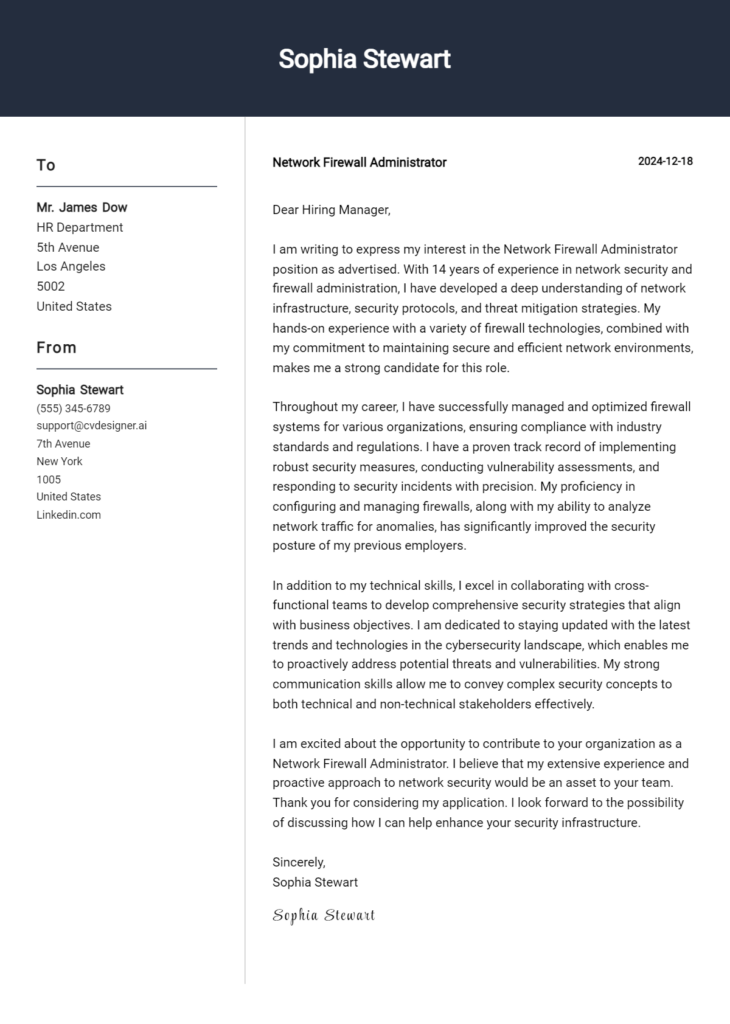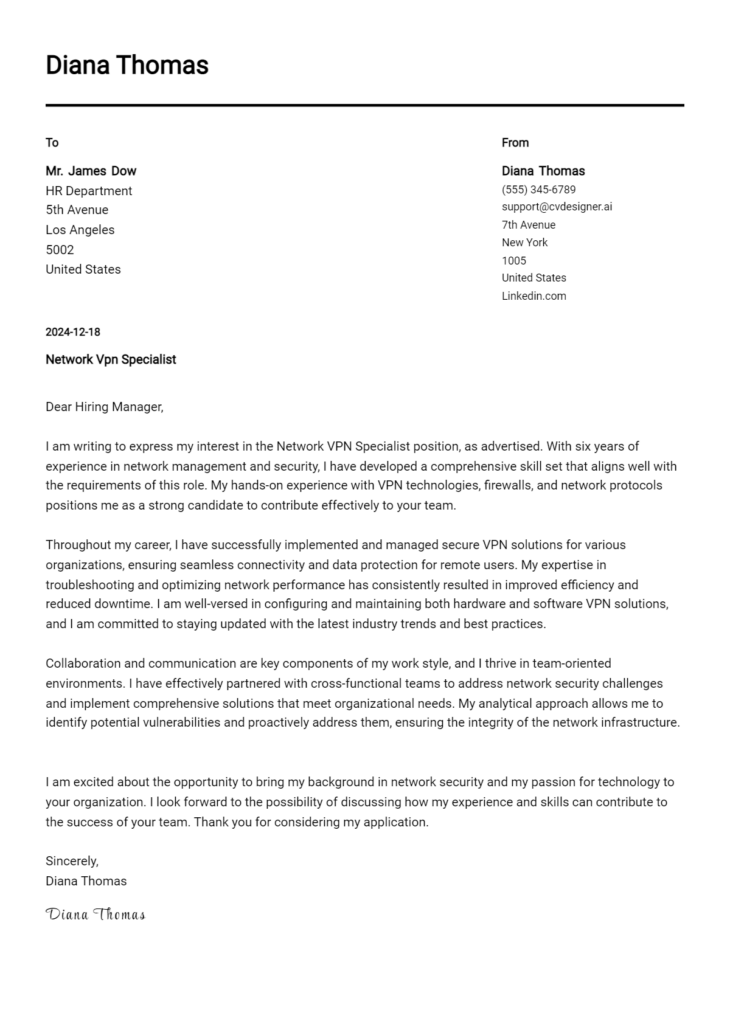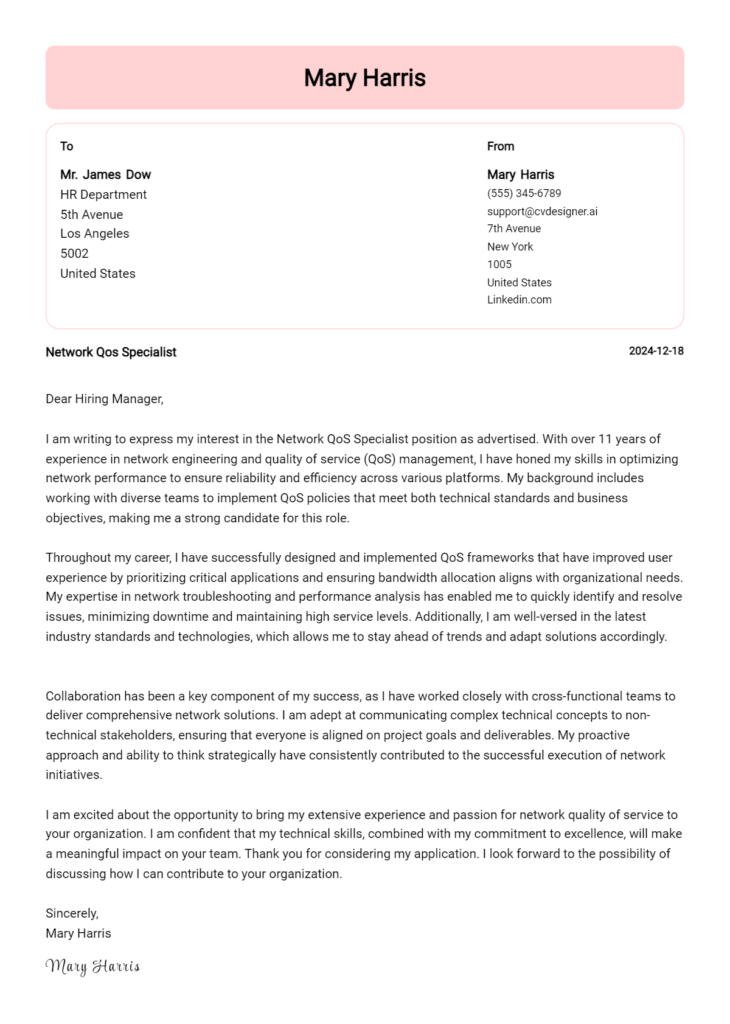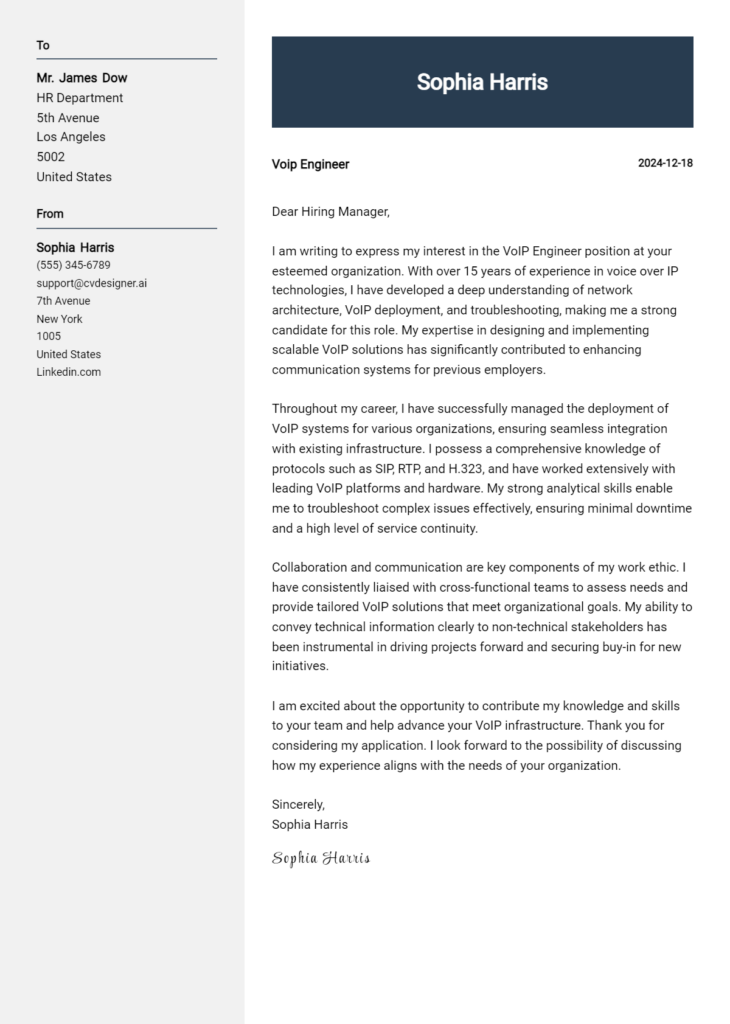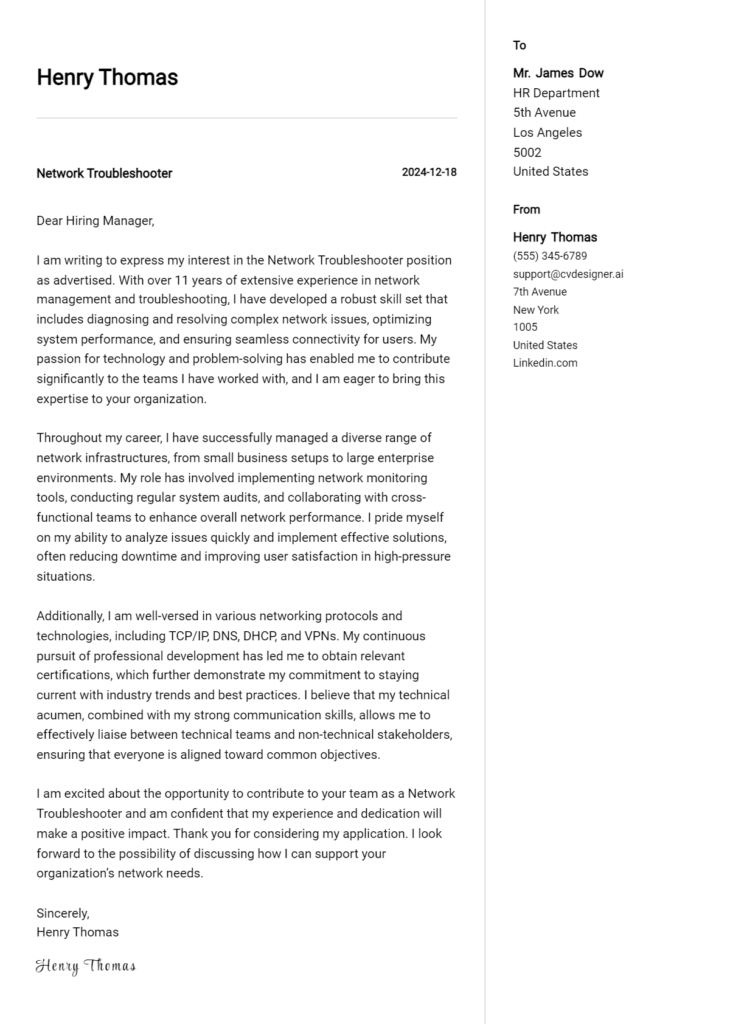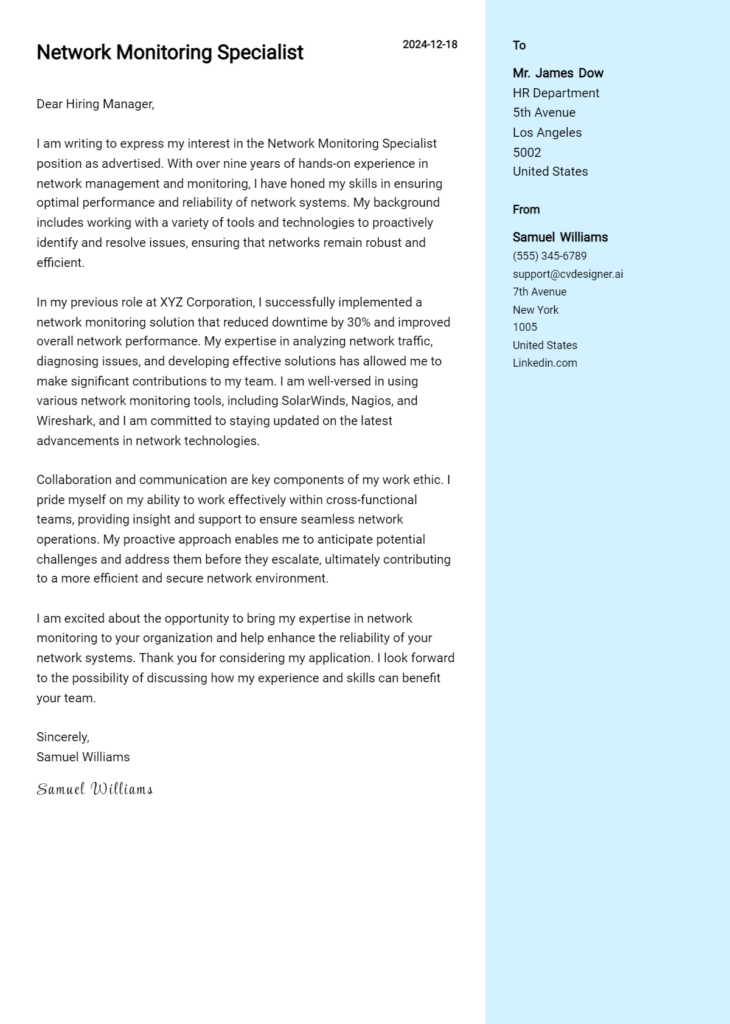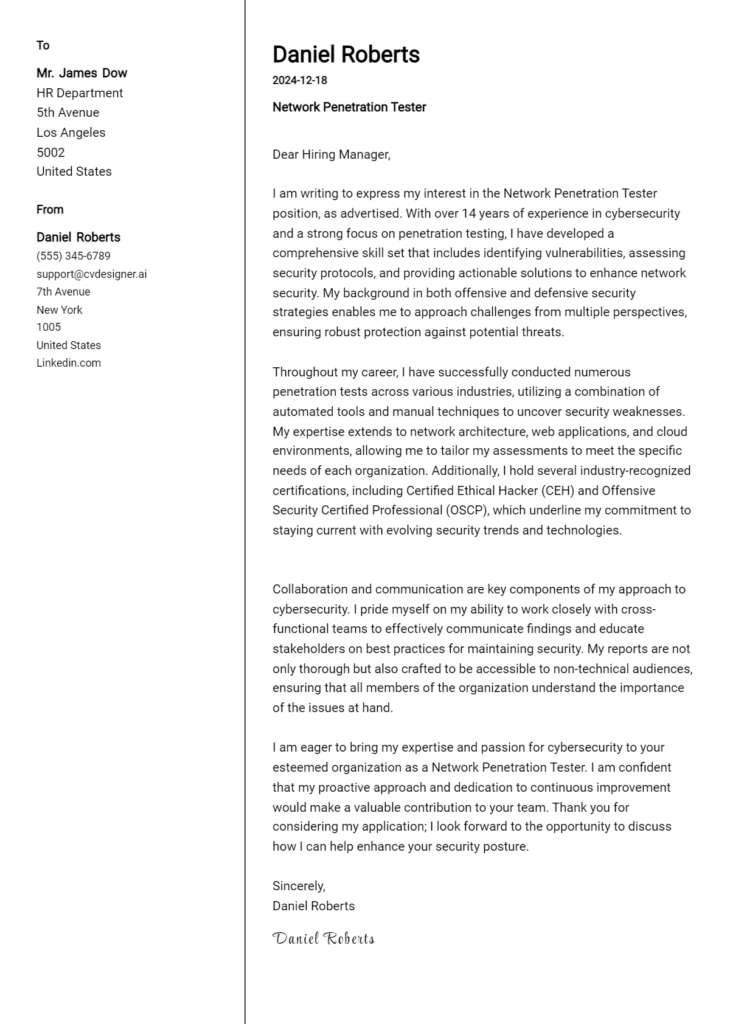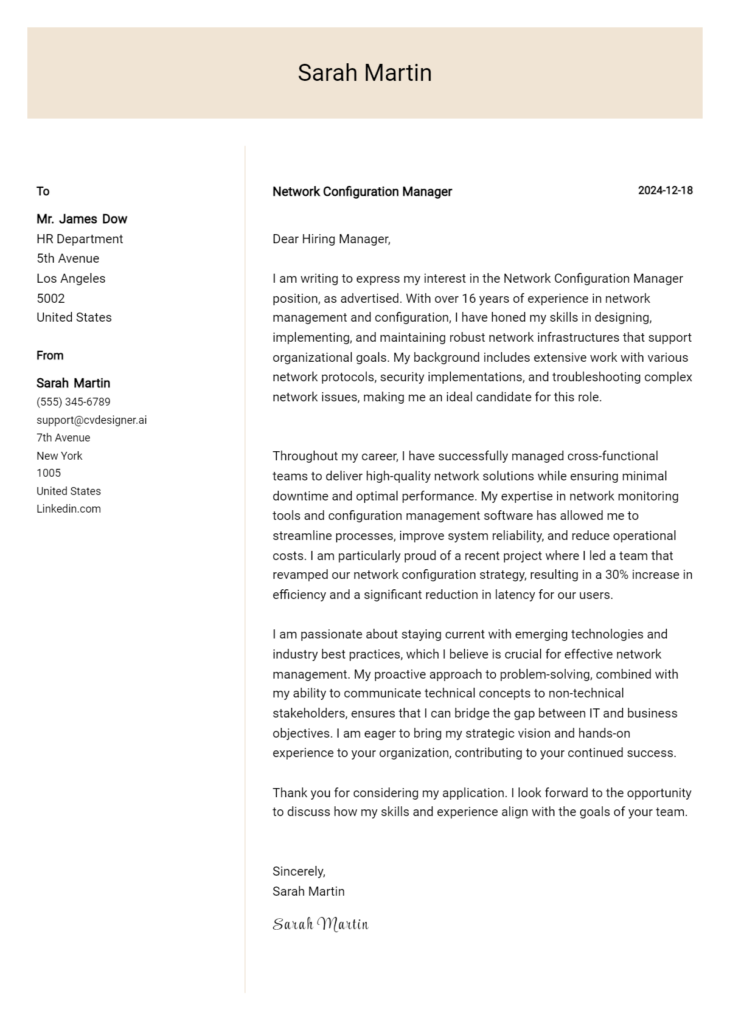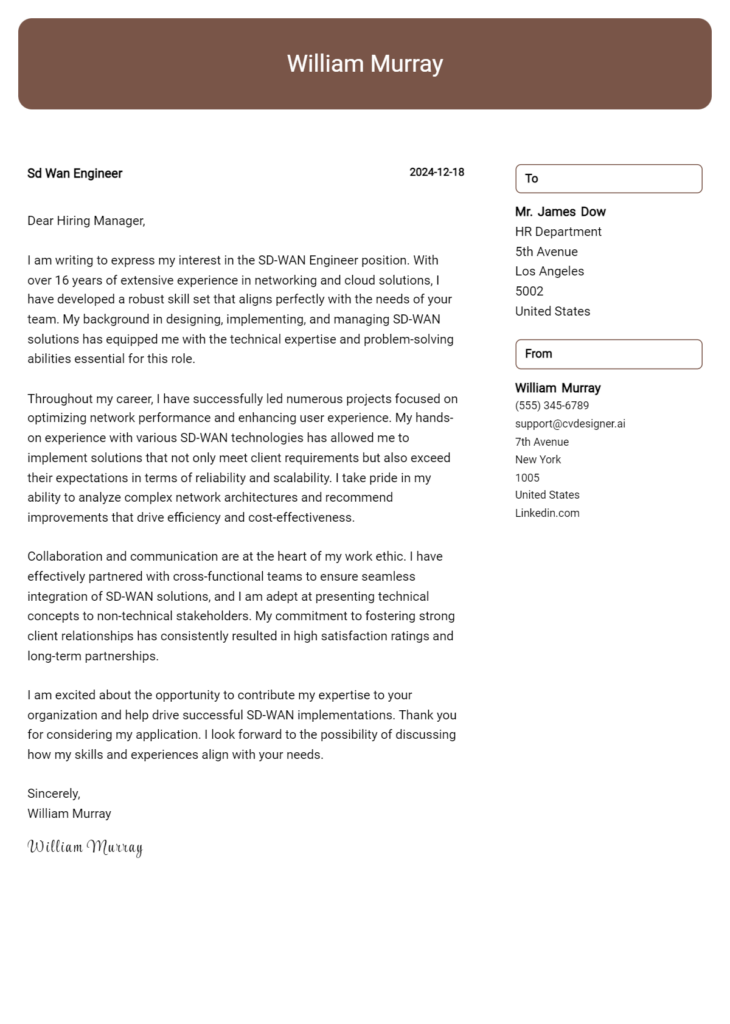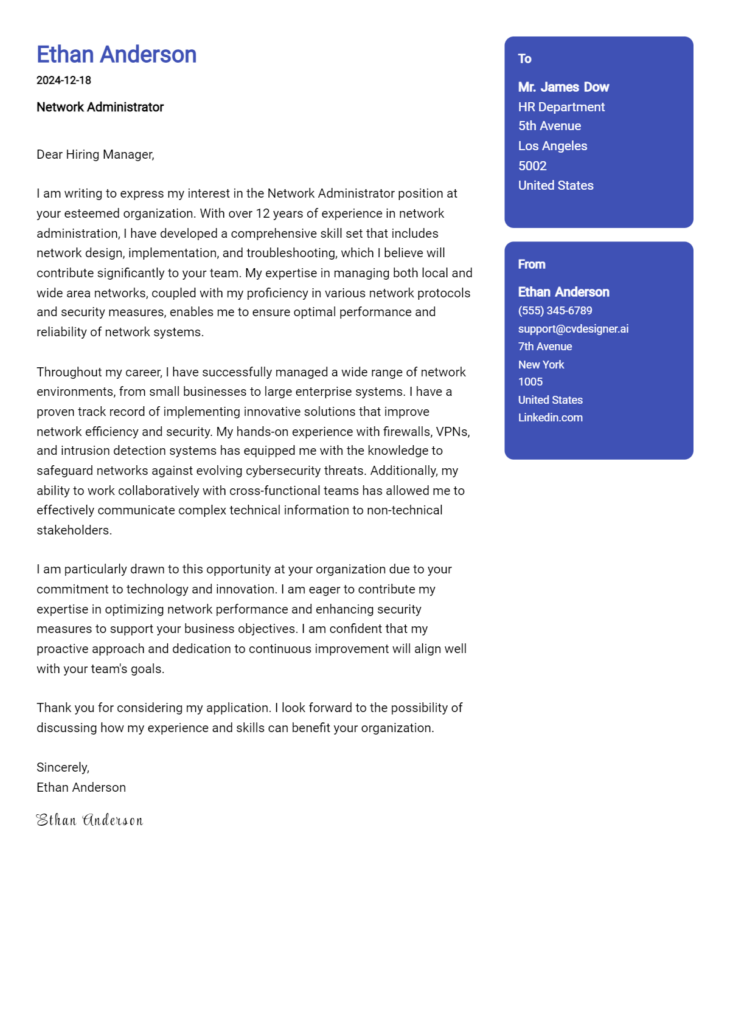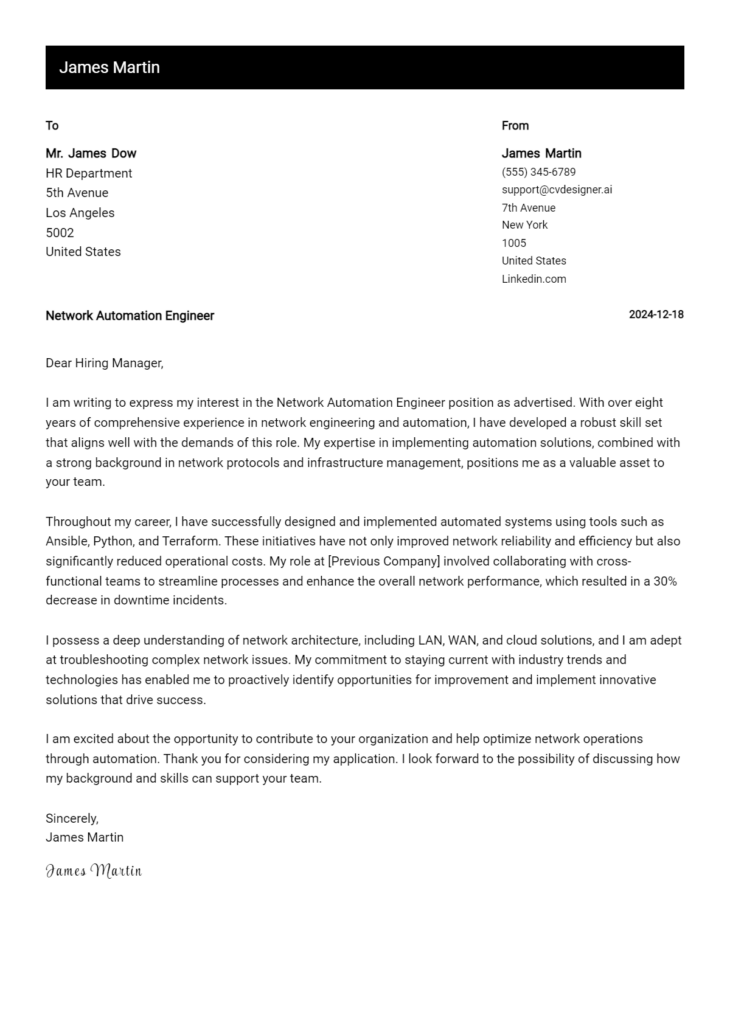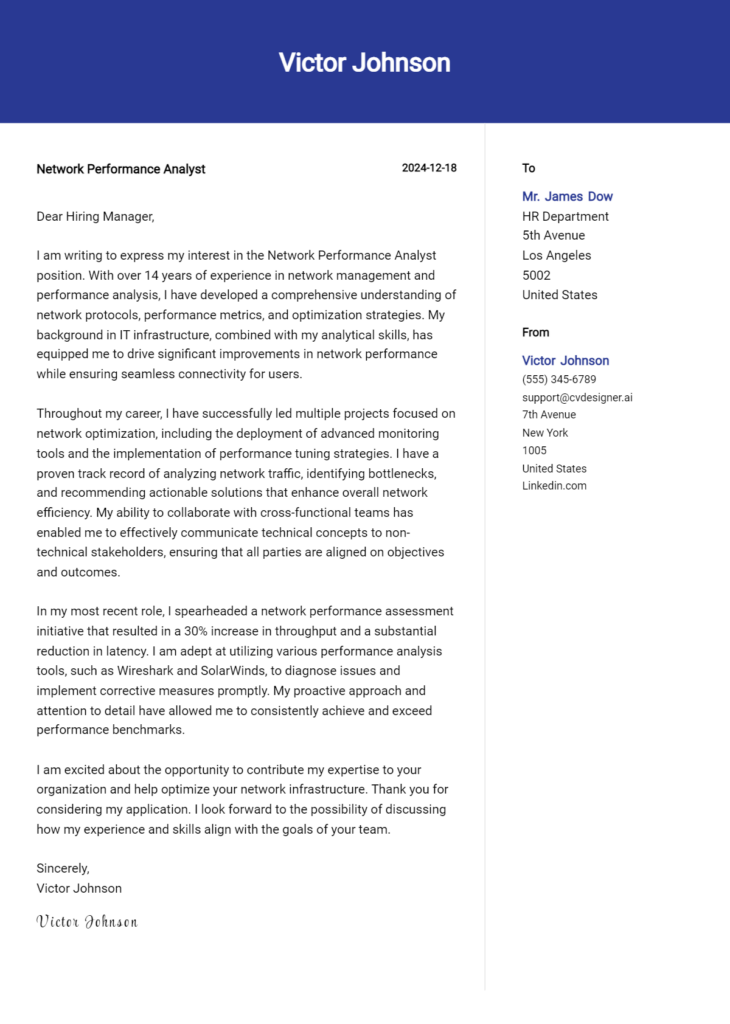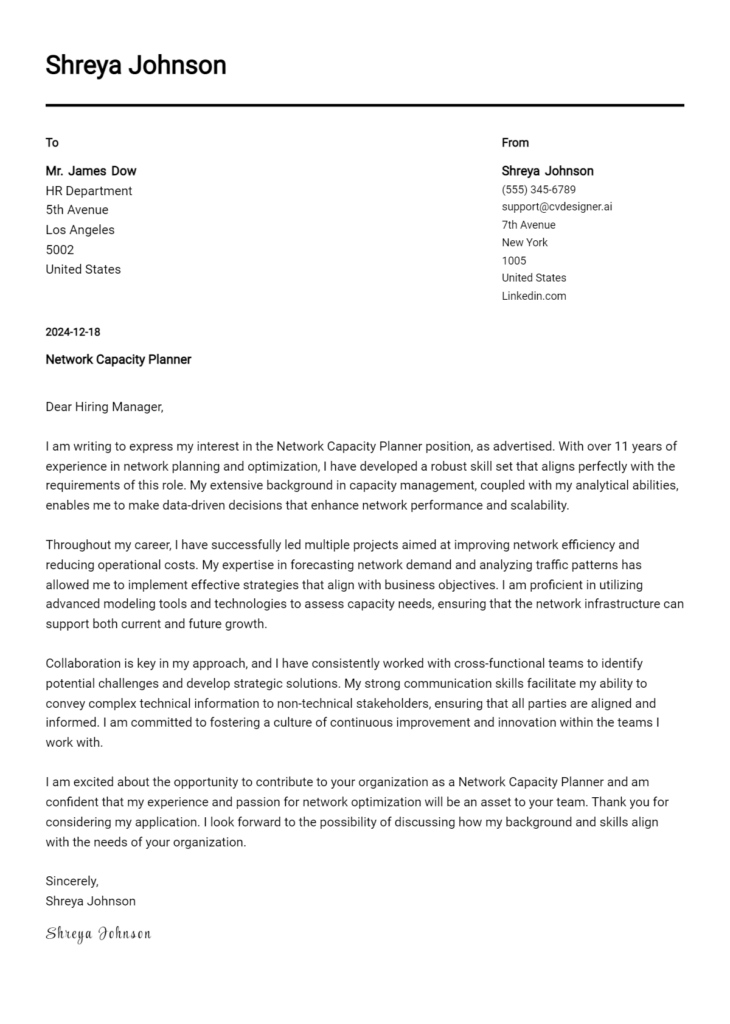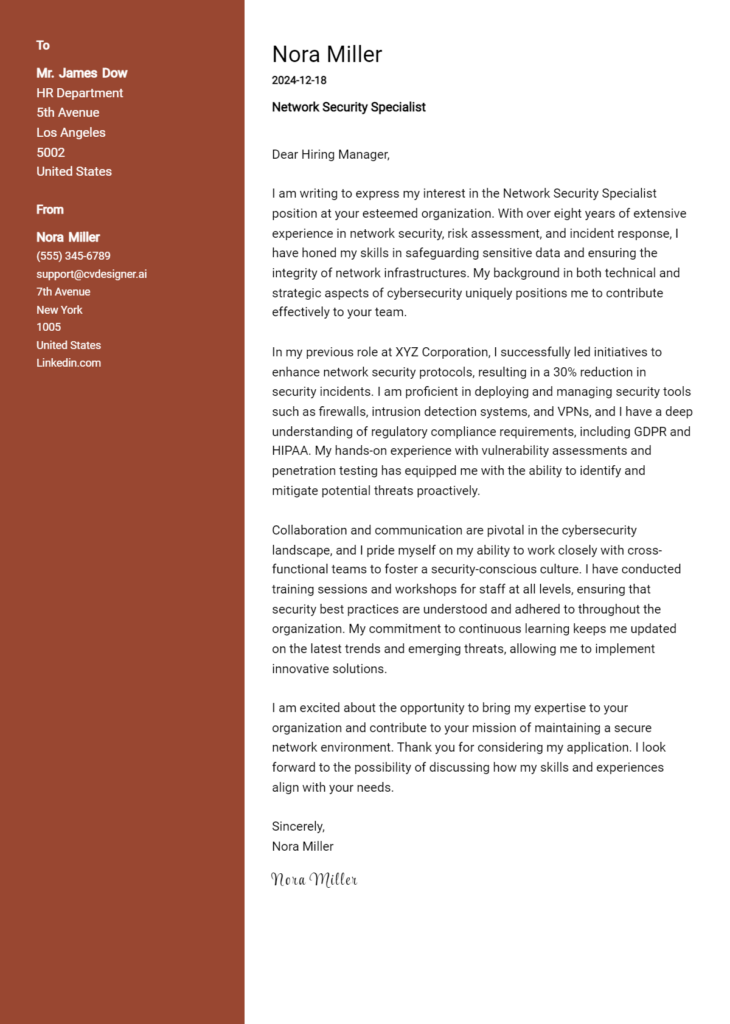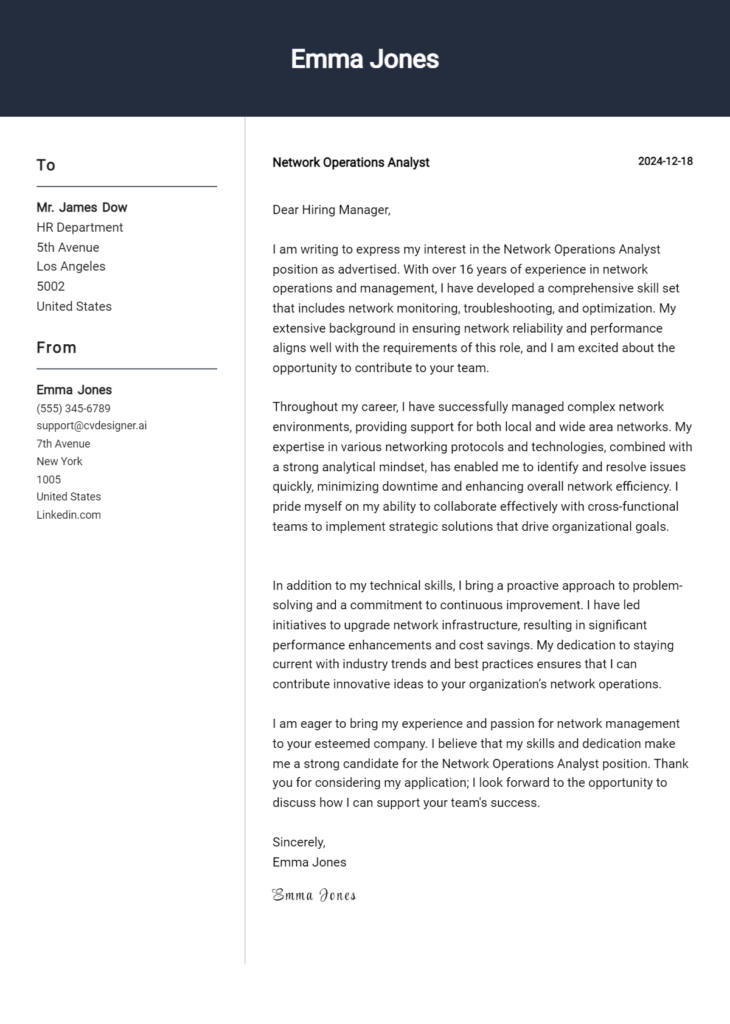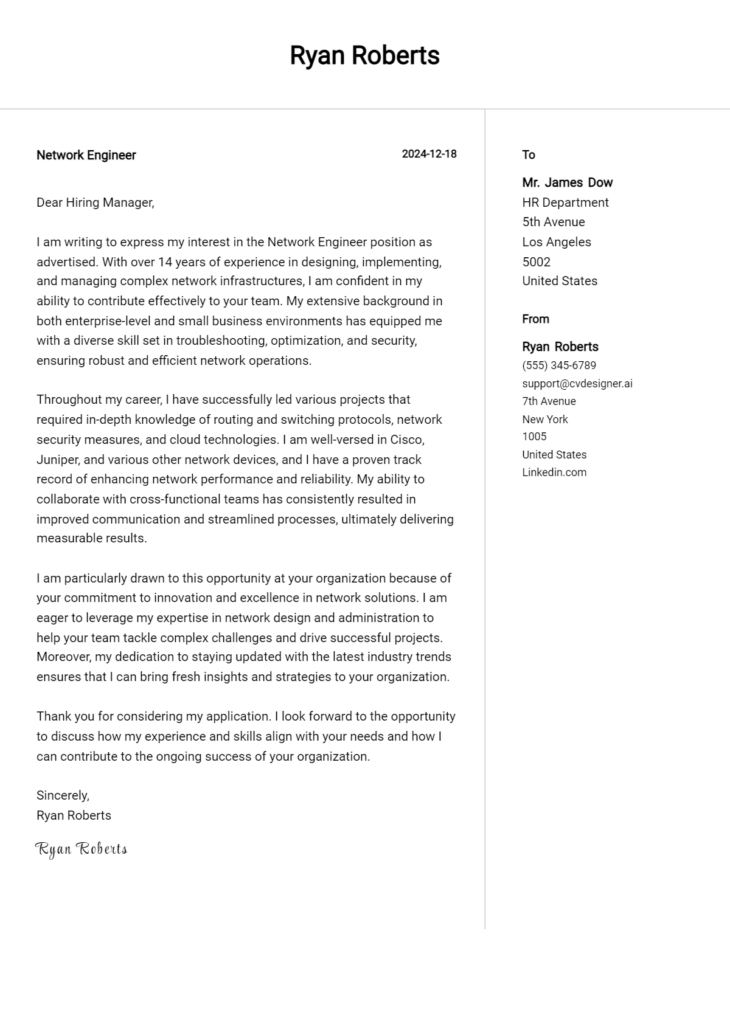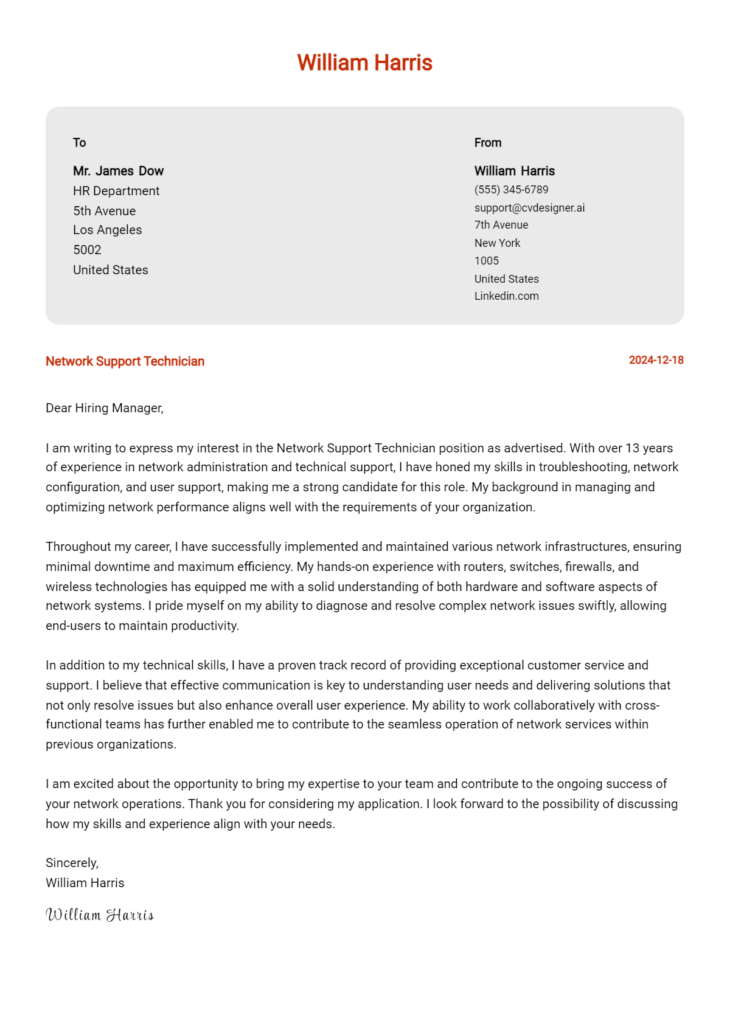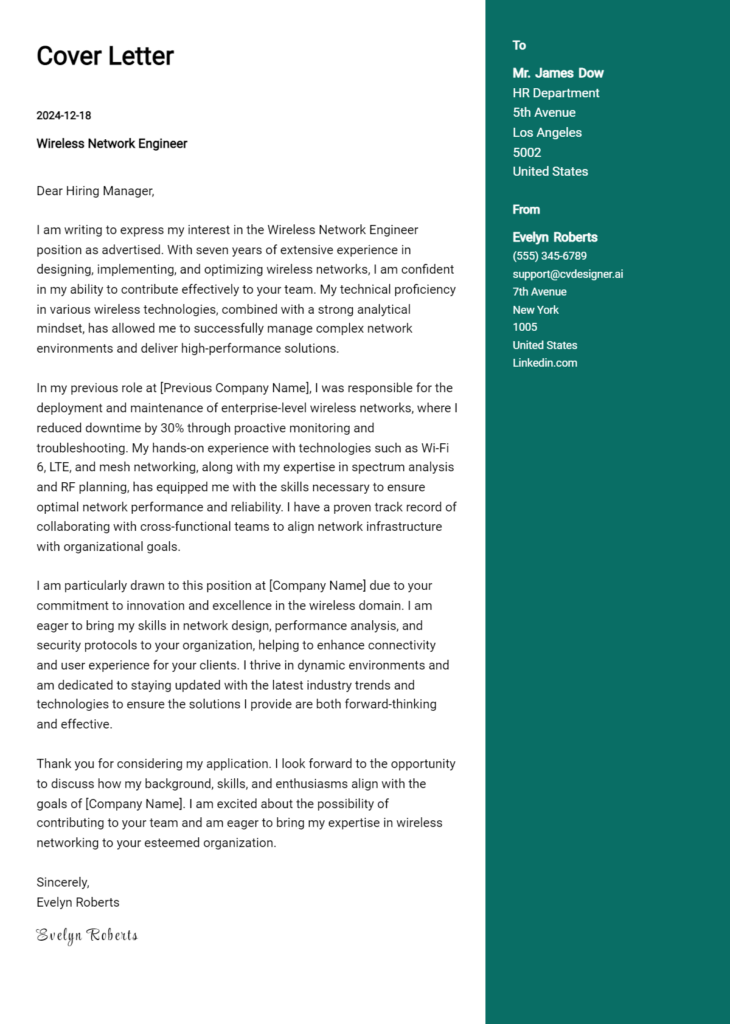Network Load Balancing Specialist Cover Letter Examples
Explore additional Network Load Balancing Specialist cover letter samples and guides and see what works for your level of experience or role.
How to Format a Network Load Balancing Specialist Cover Letter?
Crafting an effective cover letter is essential for a Network Load Balancing Specialist as it serves as your first impression to potential employers. The organization and clarity of your cover letter not only showcase your technical expertise but also demonstrate your ability to manage complex networking environments with precision. A well-structured cover letter captures the hiring manager's attention while reflecting your problem-solving skills and attention to detail—critical attributes for success in network management.
In this guide, we’ll explore how to format your cover letter, highlighting key components tailored for a Network Load Balancing Specialist.
We will focus on the essential elements of a professional cover letter, including:
- Cover Letter Header
- Cover Letter Greeting
- Cover Letter Introduction
- Cover Letter Body
- Cover Letter Closing
Each section plays a crucial role in conveying your qualifications and professionalism. Let’s delve into the details to ensure your cover letter stands out in the competitive field of network management.
Importance of the Cover Letter Header for a Network Load Balancing Specialist
A well-structured cover letter header is crucial for establishing a professional tone and ensuring clarity in communication. For a Network Load Balancing Specialist, the header serves as the first impression to potential employers, showcasing attention to detail and professionalism. It should include essential information such as your contact details, the date, and the recipient's information. This clarity allows the hiring manager to quickly identify who the application is from and how to contact you, setting the stage for the rest of your application.
A strong header reflects your qualifications and readiness for the role, while a weak header can undermine your credibility. Below are examples of a strong and weak cover letter header for a Network Load Balancing Specialist.
Strong Example
John Doe 123 Networking Way Tech City, CA 90210 (123) 456-7890 johndoe@email.com [Date] Jane Smith Hiring Manager Tech Innovations Inc. 456 Technology Rd. Innovation City, CA 90220
Weak Example
Hey, This is John Doe. Date: 10/10/2023 To whom it may concern,
The Importance of the Cover Letter Greeting
The greeting of your cover letter serves as the first impression you make on a potential employer, setting the tone for the entire document. A well-crafted greeting demonstrates professionalism and shows that you have taken the time to personalize your application by addressing the hiring manager directly. This small but significant detail can help establish rapport and convey your enthusiasm for the role. To avoid sounding generic, it's crucial to research and find the recipient's name whenever possible. A specific greeting can illustrate your attention to detail and genuine interest in the position.
Here are examples of strong and weak greetings for a Network Load Balancing Specialist cover letter:
Strong Greeting Example
Dear Mr. Smith,
Weak Greeting Example
To Whom It May Concern,
By choosing a strong greeting, you can immediately engage the reader and set a positive tone for your cover letter.
Importance of a Well-Crafted Cover Letter Introduction for a Network Load Balancing Specialist
A well-crafted cover letter introduction is crucial for a Network Load Balancing Specialist as it sets the tone for the entire application and provides the first impression to the hiring manager. This opening paragraph should be engaging, capturing the reader's attention while clearly expressing the candidate's enthusiasm for the role. Moreover, it should briefly highlight key skills or notable achievements that align with the job requirements, establishing the candidate's credibility right from the start. A strong introduction can differentiate an applicant in a competitive field, while a weak one may cause them to miss valuable opportunities.
Strong Example
Dear Hiring Manager, As a seasoned Network Load Balancing Specialist with over five years of experience in optimizing traffic distribution across complex systems, I am excited to apply for the position at [Company Name]. My expertise in implementing cutting-edge load balancing techniques has not only improved system reliability but has also reduced latency by 30% for previous employers. I am eager to bring my strong analytical skills and passion for innovative network solutions to your team, ensuring seamless performance and exceptional user experiences.
Weak Example
Hello, I saw the job posting for a Network Load Balancing Specialist and thought I should apply. I have some experience in networking and have worked with load balancing tools before. I hope to contribute to your company in some way.
Purpose of the Cover Letter Body for a Network Load Balancing Specialist
The body of a cover letter for a Network Load Balancing Specialist serves as a critical opportunity for the candidate to showcase their technical skills, relevant experiences, and the unique value they bring to the organization. It allows the candidate to highlight specific projects or accomplishments that demonstrate their expertise in managing and optimizing network performance through load balancing techniques. By articulating their achievements, such as successfully implementing a load balancing solution that improved system uptime by a certain percentage or reduced latency in a previous role, candidates can effectively convey how their background aligns with the company's needs and objectives.
Strong Example
Dear [Hiring Manager's Name], I am excited to apply for the Network Load Balancing Specialist position at [Company Name]. In my previous role at [Previous Company], I led a project that involved the deployment of a multi-tier load balancing architecture that increased our application’s availability by 35% and reduced response times by 50%. This achievement was pivotal during peak traffic periods and directly contributed to our customers’ satisfaction ratings, which climbed significantly as a result. My hands-on experience with technologies such as F5 BIG-IP and HAProxy, combined with my certification in AWS, equips me with the skills necessary to effectively manage and optimize your network infrastructure. I am eager to bring my expertise in load balancing solutions to [Company Name] and help drive your network performance to new heights. Sincerely, [Your Name]
Weak Example
Dear [Hiring Manager's Name], I am writing to express my interest in the Network Load Balancing Specialist position at [Company Name]. I have some experience in network management and have worked on a few projects, but I am not sure how relevant they are. I think I could help your company because I have some skills in networking. I have done some tasks involving load balancing, but I don't remember the specifics. I am very eager to learn and would like to discuss this role further. Thank you, [Your Name]
Importance of the Cover Letter Closing for a Network Load Balancing Specialist
The closing paragraph of a cover letter is crucial as it serves to reinforce the candidate's qualifications, express enthusiasm for the role, and prompt action from the hiring manager. For a Network Load Balancing Specialist, effectively summarizing relevant skills and showcasing a genuine interest in the position can leave a lasting impression. Additionally, encouraging the employer to review the resume and consider scheduling an interview helps to maintain momentum in the application process.
Strong Example
Thank you for considering my application for the Network Load Balancing Specialist position. With my extensive experience in optimizing network performance and ensuring high availability, I am excited about the opportunity to contribute to your team. I am eager to discuss how my skills align with the needs of your organization and would welcome the chance to meet for an interview. Please feel free to review my resume for further details on my qualifications. I look forward to the possibility of working together to enhance your network infrastructure.
Weak Example
I hope you like my application. I think I could do well in this job. Please look at my resume if you want. Let me know if you want to talk.
These tips will help candidates craft an effective cover letter for a Network Load Balancing Specialist position, a role that requires a unique blend of technical expertise and collaborative problem-solving skills. In this highly specialized field, it is crucial to demonstrate not only your proficiency in network load balancing technologies but also your understanding of the Software Development Life Cycle (SDLC). Highlighting your ability to work as part of a team and your commitment to continuous learning will make your application stand out.
Cover Letter Writing Tips for Network Load Balancing Specialist
Showcase Your Technical Skills: Start your cover letter by emphasizing your expertise in network load balancing technologies, such as F5, Cisco, or NGINX. Detail your experience with configuration, monitoring, and troubleshooting, ensuring you use specific examples that demonstrate your capabilities. This is your opportunity to show potential employers that you are well-versed in the tools and technologies that are critical to the role.
Highlight Problem-Solving Abilities: In the field of network load balancing, you will often face complex challenges. Use your cover letter to illustrate a significant problem you encountered in a previous role and how you resolved it. Discuss your thought process, the steps you took to analyze the situation, and the outcome. This not only shows your analytical skills but also your ability to remain calm under pressure.
Demonstrate SDLC Knowledge: Since load balancing is integral to application performance, mentioning your understanding of the Software Development Life Cycle (SDLC) is essential. Explain how you have collaborated with development teams to ensure that load balancing solutions align with application deployment and scaling needs. This will illustrate your holistic understanding of IT operations and application performance.
Emphasize Teamwork and Collaboration: Network load balancing specialists often work in teams with network engineers, system administrators, and developers. Highlight your experiences working collaboratively in a team environment, focusing on how you contributed to successful projects. Mention any specific methodologies you followed, such as Agile or DevOps, to underline your adaptability and communication skills.
Express a Passion for Continuous Learning: The tech landscape is always evolving, and demonstrating a commitment to continuous learning will set you apart from other candidates. Mention any relevant certifications, training programs, or workshops you’ve attended. Discuss how you stay updated with the latest trends in network technologies and load balancing strategies, which shows your proactive approach to professional development.
Incorporating these tips into your cover letter can significantly enhance its effectiveness. For more resources, consider checking out cover letter templates or using a cover letter builder to streamline your writing process.
Common Mistakes to Avoid in a Network Load Balancing Specialist Cover Letter
Crafting a compelling cover letter is vital for standing out in a competitive job market, especially for a specialized role like a Network Load Balancing Specialist. Avoiding common mistakes can significantly enhance your chances of making a favorable impression. Here are some pitfalls to steer clear of:
Generic Content: Failing to personalize your cover letter for the specific role. Always tailor your letter to highlight relevant skills and experiences related to network load balancing.
Overly Technical Language: Using jargon that may confuse the reader. While technical skills are important, ensure your language is accessible and clear.
Neglecting the Format: Ignoring proper cover letter format can make your application look unprofessional. Refer to guidelines on cover letter format to ensure your layout is polished.
Lack of Specific Examples: Not providing specific examples of your achievements in previous roles. Use data or metrics to demonstrate your impact, which helps make your case more compelling.
Typos and Grammatical Errors: Submitting a cover letter filled with errors can be detrimental. Always proofread your content or use tools to check for mistakes before sending.
Not Mentioning the Company: Failing to show your interest in the company can make your letter feel impersonal. Research the company and mention how your skills align with their goals.
Ignoring the Call to Action: Leaving out a strong closing statement can weaken your letter. Encourage the hiring manager to contact you for further discussion.
By being mindful of these mistakes and incorporating effective strategies, you can improve your cover letter and increase your chances of landing that crucial interview. For inspiration, check out some cover letter examples to guide your writing process.
Cover Letter FAQs for Network Load Balancing Specialist
What should I include in my cover letter for a Network Load Balancing Specialist position?
In your cover letter, start by introducing yourself and stating the position you’re applying for. Highlight your relevant experience, particularly in network management and load balancing technologies like NGINX, HAProxy, or F5. Discuss specific projects where you have successfully implemented load balancing solutions to improve performance and reliability. Mention your understanding of network protocols, as well as your ability to troubleshoot and optimize network traffic. Lastly, express your enthusiasm for the role and how your skills align with the company’s goals. Personalizing your letter by referencing the company’s recent achievements or projects can also make a significant impact.
How can I demonstrate my technical skills in my cover letter?
To effectively demonstrate your technical skills in your cover letter, use quantifiable achievements and specific examples. For instance, instead of just stating that you have experience with load balancing, describe a situation where you optimized traffic distribution, resulting in a 30% increase in application performance. Mention the specific technologies and tools you utilized, such as configuring virtual servers or implementing failover strategies. Additionally, you can highlight any certifications you hold, such as those from Cisco or CompTIA, that are relevant to network management. By providing concrete evidence of your skills, you’ll create a compelling case for your candidacy.
How do I address gaps in my experience related to load balancing?
If you have gaps in your experience specifically related to load balancing, be honest and strategic in your cover letter. Focus on transferable skills from other roles that can apply to load balancing, such as experience in network administration, systems engineering, or cloud computing. Discuss how these roles have equipped you with skills in network design, troubleshooting, and performance optimization. If you have taken any courses or obtained certifications in load balancing technologies, mention them to show your commitment to learning. Emphasize your eagerness to grow and adapt, and express your readiness to tackle the challenges of the Network Load Balancing Specialist role.
Should I include soft skills in my cover letter, and if so, which ones?
Yes, including soft skills in your cover letter is essential, as they complement your technical abilities. For a Network Load Balancing Specialist, effective communication is crucial for collaborating with cross-functional teams and conveying complex technical concepts to non-technical stakeholders. Problem-solving skills are also vital, as you will encounter various challenges that require quick thinking and innovative solutions. Additionally, showcasing your attention to detail can highlight your ability to monitor and analyze traffic patterns effectively. Teamwork and adaptability are other important soft skills, especially in dynamic environments where load balancing strategies may need to be adjusted frequently. By showcasing these skills, you can present yourself as a well-rounded candidate.
Build your Cover Letter in minutes
Use an AI-powered cover letter builder and have your letter done in 5 minutes. Just select your template and our software will guide you through the process.

